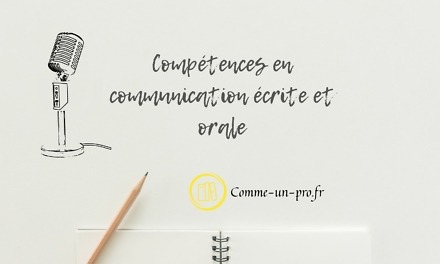Today, in the professional world, an essential and often neglected skill is "knowing how to write". A quality which, in the digital age, is often forgotten.
However, over time, we realize that this skill can make a difference at some point. As an illustration, consider this exchange with a HRD:
« For the recruitment planned today, have you found a candidate ?
- We carried out many tests and in the end we had two contenders with almost the same background, similar experiences. They are both available to start in this new position.
- What are you going to do to decide between them ?
- It's not complicated ! We will choose which of the two has the best writing fluency. »
In case of doubt, priority is given to the one who writes the best.
The example above illustrates very well, how writing can be disqualifying in a recruiting process. Whether you are good or bad in any industry, experience has shown that having excellent writing can lead a person to seize certain opportunities. The quality of his writing thus becomes a distinctive skill. An element that can provide additional legitimacy in the context of a hiring for example. A recruitment firm attests to this, stating: " With equal skills, hire the one who writes the best ». The nature of a candidate's writing most often illustrates the care he can bring to his work; a characteristic that does not leave recruiters indifferent.
Mastery of writing: an essential asset
Writing is an important part of the job, whether it's writing an email, correspondence, a report, or even a form. It thus facilitates the organization of day-to-day operations. In addition, writing is recurrent in professional life. In particular electronic mail, which is becoming an essential process within any business. Directives between the hierarchy and the collaborators or exchanges between customers and suppliers. Writing well therefore turns out to be a desired skill, even if it rarely appears in business reference systems.
Writing is very stressful for many of us. To make this discomfort disappear, ask yourself the following questions:
- Do I really have the basic knowledge of writing in French?
- Is my writing usually precise and clear enough?
- Should I change the way I write my emails, reports and more?
What conclusion can we take from this?
The questions set out above are quite legitimate. In a professional environment, two essential things are most often expected when it comes to writing.
We have, first, the form where it is essential to pay particular attention to the draw up a, To thespelling, but also toorganization of ideas. Thus, each of your writings must take into account precision and clarity without forgetting conciseness.
Finally, the contents that you make available to your colleagues or superior hand writing. Must be relevant. It is not a question of writing in order to write but to be read and understood. Just like you, no one has time to waste.




